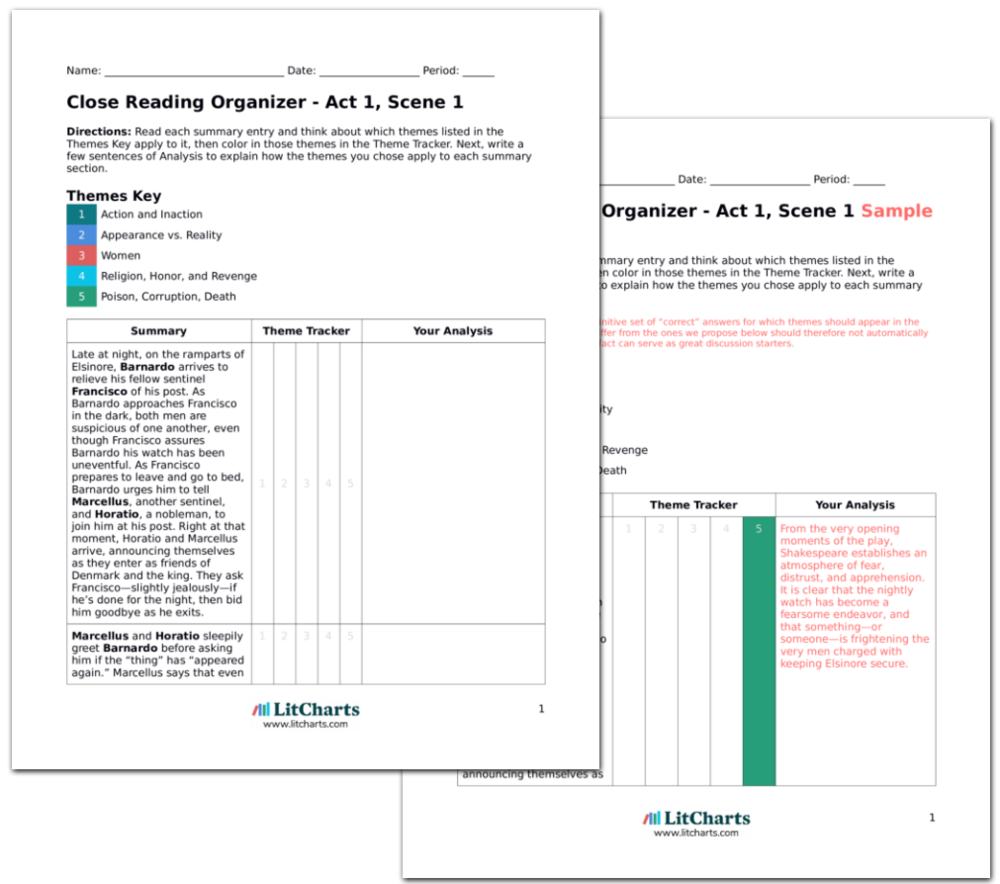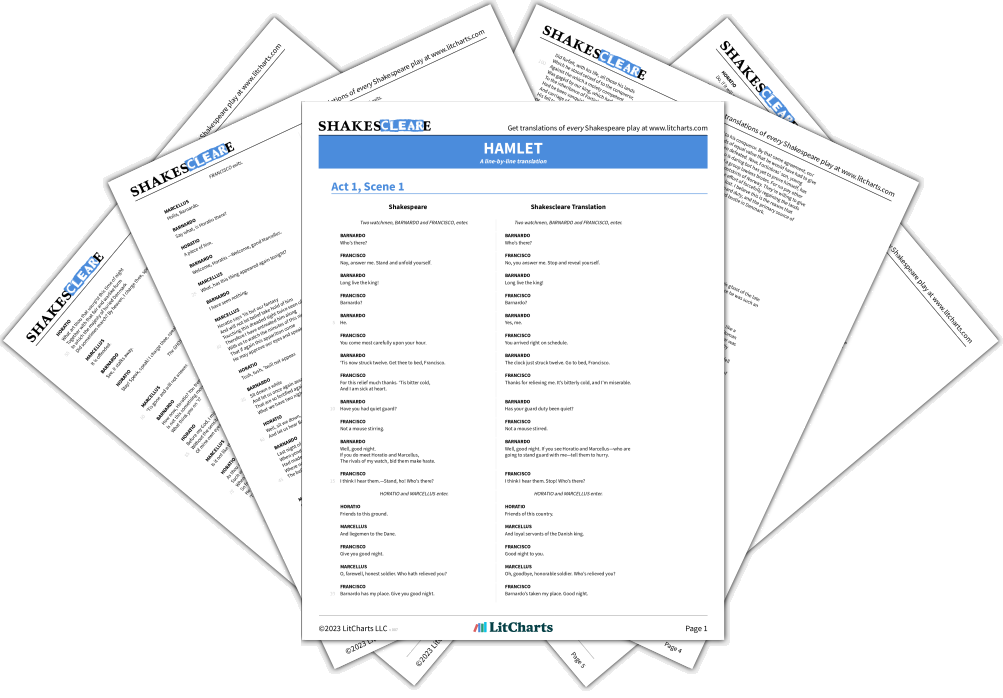![]()
LitCharts assigns a color and icon to each theme in Hamlet, which you can use to track the themes throughout the work.
![]()
![]()
![]()
![]()
![]()
Gertrude , Horatio , and a member of court are in the hall of Elsinore. The courtier tells Gertrude that Ophelia is demanding to meet with her. Gertrude doesn’t want to speak to Ophelia, but the courtier says that Ophelia has gone mad and taken to meaningless babbling. Horatio suggests Gertrude hear Ophelia out, and Gertrude agrees to see her—though, in an aside, she remarks that Ophelia’s decline seems, to her “sick soul,” like “prologue to some great amiss”—in other words, if Ophelia has lost it, something truly terrible is coming.
Gertrude’s reaction to the news of Ophelia’s madness—and her desire to avoid witnessing it—shows just how ostracized and reviled those who have lost their minds truly are. Ophelia's madness also once again highlights the weakness and dangers of Hamlet's constant pretending and half-measures. While he has pretended to go mad, Ophelia has actually gone mad. In fact, by pretending to be mad Hamlet seems to have driven Ophelia actually mad.
Active Themes![]()
![]()
Ophelia enters, singing a song about love. Gertrude politely asks Ophelia what her song means, but Ophelia urges the queen to listen as she continues singing about a man who is “dead and gone.” Ophelia continues singing on and on about a man shrouded, entombed, and covered in “sweet flowers ” even as Gertrude asks her to stop. Claudius enters and greets Ophelia calmly, asking how she’s feeling; she responds with a confusing tale about a baker’s daughter who was turned into an owl—the moral of the tale is that “we know what we are, but know not what we may be.” Claudius remarks that Ophelia’s grief over her dead father has driven her mad.
Ophelia’s seemingly nonsensical tale about the baker’s daughter is actually very thematically revealing. People may know who they are in the moment, but can’t predict who they’ll become or what twists their fate will take: it is impossible to predict the future of one’s reality or prepare for it.
Active Themes![]()
![]()
![]()
Ophelia begins singing more songs about unrequited love and women being “tumbled” and mistreated by unfaithful men. She stops her song to remark that she cannot stop thinking about her father being laid in the “cold ground”—she swears she will inform her brother of what has happened. Bidding Claudius and Gertrude “good night,” she leaves the hall. Claudius asks Horatio to follow Ophelia and keep an eye on her. After Horatio leaves, Claudius tells Gertrude that Ophelia has fallen victim to the “poison of deep grief” in the wake of her father’s death and Hamlet’s departure for England.
Grief is seen as a “poison” in Denmark. It leads to resentment and the desire for revenge, as in the case of Hamlet, and Claudius is worried that Ophelia or her brothers will be “poisoned” toward bloody vengeance by their sadness and anger over their father’s death.
Active Themes![]()
![]()
![]()
![]()
There is a loud noise outside, and then a messenger comes into the hall. The messenger reports that Laertes has taken up arms against Claudius —and that he has the support of the Danish people, who cry in the streets “Laertes shall be king!” Gertrude is scandalized. There is another loud noise—Claudius realizes the rebels have broken down the door.
Laertes has taken decisive action against Claudius, believing he is responsible for Polonius’s death. Laertes is the opposite of Hamlet, as Hamlet has refused to take action even though he now knows his uncle is a murderer, rather than just suspecting it.
Active Themes![]()
![]()
"My students can't get enough of your charts and their results have gone through the roof." -Graham S.

Laertes enters with a band of followers but tells them to stand down while he meets with the king. When he lays eyes on Claudius , he tells the man he has come to avenge his father—were he calm in the face of his father’s murder, he says, he might as well be his father’s “bastard.” Claudius tells Laertes that though Polonius is dead, he was not the one to kill the man. Laertes asks how Polonius died, vowing to cast allegiance and loyalty aside in order to serve justice to whoever killed his father. Claudius promises, once again, that he is innocent of Polonius’s murder, and warns Laertes not to attack his friends in an attempt to level with his enemies.
Claudius doesn’t immediately blame Hamlet for Polonius’s murder, suggesting that Claudius doesn’t necessarily want to provoke Laertes to seek revenge on the prince. Claudius, like Polonius, enjoys the act of manipulation, and wants to calm Laertes down and talk him out of his vengeance so that his own plan to have Hamlet killed in England can go forth as planned.
Active Themes![]()
![]()
![]()
Another noise is heard offstage, and Ophelia enters. As Laertes sees what has become of his sister, he swears that he will make sure his revenge is “paid by [the] weight” of her madness. Ophelia continues singing a morbid song about a man being carried to his grave in an uncovered coffin. Laertes listens to Ophelia’s troubling songs, noting that her madness says more about the depths of her grief than sane words ever could. Ophelia begins passing out invisible flowers —she gives out rosemary, pansies, fennel, and daisies, but states that all her violets withered with the death of her father. Laertes remarks that his sweet sister is still able to turn “hell itself” into “favor and […] prettiness.”
Even in the depths of her madness, Ophelia continues doing traditionally womanly or feminine things—passing out flowers and entertaining the others with songs, even if her macabre tunes miss the beat. In this passage, each of the flowers she passes out have different symbolic meanings—for instance, fennel represents sorrow, while daisies represent innocence. In this sense, they seem to represent Ophelia’s own inner complexity and multifaceted personality, which has been stifled and controlled by Polonius and other men up until this point.
Active Themes![]()
![]()
![]()
Claudius says he shares in Laertes ’s grief over the disintegration of Ophelia ’s mind. He offers to stand and be judged by Laertes and his wisest, closest friends, and, once he’s proved innocent, to help Laertes exact revenge on the one who brought such grief upon his family.
Claudius knows that if he can just keep Laertes from attacking him, he can direct the young man’s grief according to his own devices—and hold another pawn in his pocket.
Active Themes![]()
![]()
![]()
![]()

“Would not have made it through AP Literature without the printable PDFs. They're like having in-class notes for every discussion!”
Get the Teacher Edition
“This is absolutely THE best teacher resource I have ever purchased. My students love how organized the handouts are and enjoy tracking the themes as a class.”
Hamlet in Plain English
“Every teacher of literature should use these translations. They completely demystify Shakespeare. Students love them!”
Copyright © 2024 All Rights Reserved Save time. Stress less.AI Tools for on-demand study help and teaching prep.
 Quote explanations, with page numbers, for over 44,324 quotes.
Quote explanations, with page numbers, for over 44,324 quotes. PDF downloads of all 2,003 LitCharts guides.
PDF downloads of all 2,003 LitCharts guides. Expert analysis to take your reading to the next level.
Expert analysis to take your reading to the next level. Advanced search to help you find exactly what you're looking for.
Advanced search to help you find exactly what you're looking for.
 Expert analysis to take your reading to the next level.
Expert analysis to take your reading to the next level. Advanced search to help you find exactly what you're looking for.
Advanced search to help you find exactly what you're looking for.